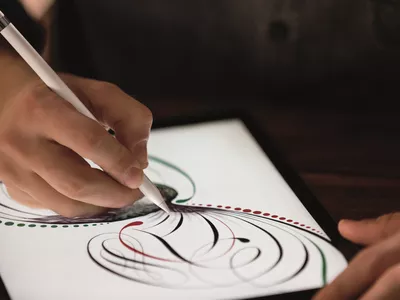
How To Enable USB Debugging on a Locked Vivo Phone

How To Enable USB Debugging on a Locked Vivo S18e Phone
Unlocking your Android’s potential goes beyond its surface features. Understanding USB debugging is key to troubleshooting and maximizing your device’s capabilities. In simple terms, USB debugging allows deeper access to your phone’s functionalities, aiding in software development and data recovery.
However, enabling USB debugging becomes crucial yet challenging when your phone is locked. This article delves into this necessity, explaining how to enable USB debugging on locked phones, especially for Android users. Unravel the mystery behind this essential feature, empowering yourself to navigate through locked phone scenarios effortlessly.
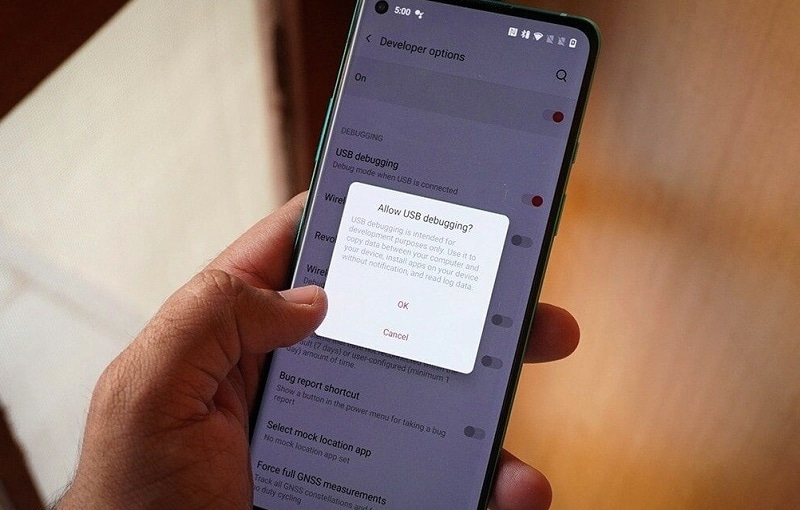
Part I. Challenges in Enabling USB Debugging on a Locked Android Phone
USB debugging is a nifty tool that lets you peek behind the scenes of your Android phone’s software. It’s like having a secret key that unlocks deeper access to your device, enabling tasks like software tweaking, app testing, and even data recovery.

Challenges in Enabling USB Debugging on a Locked Phone
Outlined below are some of the barriers, scenarios, and limitations, shedding light on the challenges that make USB debugging seemingly impossible.
- **Locked-out access.**When your phone is locked, gaining access to the settings becomes a roadblock to enabling USB debugging.
- **Limited functionality.**The phone’s locked state restricts the usual methods of accessing developer settings and USB debugging options.
- **Security measures.**For security reasons, most devices limit access to sensitive settings when the phone is locked, making it tricky to enable USB debugging.
Scenarios Requiring USB Debugging on a Locked Phone
Unlocking your phone’s potential becomes crucial in moments of crisis. Explore below some of the scenarios where enabling USB debugging on a locked Android device becomes your beacon of hope:
- **Data recovery.**Imagine accidentally locking yourself out of your phone with important data inside. Enabling USB debugging could be your ticket to retrieve that precious information.
- **Software troubleshooting.**Sometimes, a locked phone might need software fixes or troubleshooting that requires USB debugging to access certain tools.
- **Device testing.**For developers or tech-savvy users, testing new apps or debugging software issues often demands enabling USB debugging, even when the phone is locked.
Part II. How To Enable USB Debugging on Locked Phones
This section outlines the traditional method of enabling USB debugging on an Android phone. Stay tuned and check out the steps below:
- Step 1: Unlock your device**.** If needed, enter your phone’s passcode or pattern to gain access to the Settings.
- Step 2: Go to Settings, scroll down to About Phone, and tap on Build number seven or eight times to unlock the Developer Options.

Step 3: Once unlocked, return to Settings, find Developer Options (usually at the bottom), and enter the menu. Enable USB Debugging by tapping OK once the Allow USB Debugging? message appears.
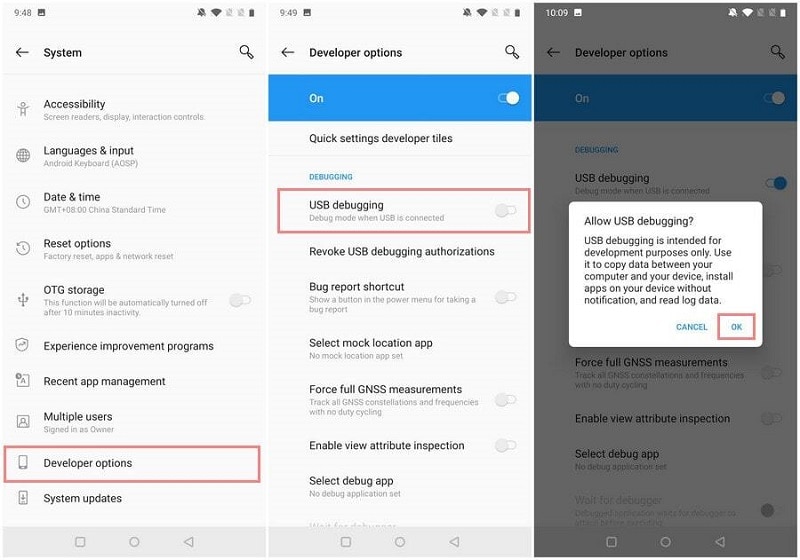
However, what if your phone remains locked, making these steps impossible? Such a case calls for an alternative solution. Fortunately, there is one tool that is fully reliable when it comes to unlocking locked mobile devices. Dr.Fone - Screen Unlock (Android) can help bypass these challenges and enable USB debugging on a locked Android phone effortlessly. So, buckle up as the next section unravels the secrets to unlock your device’s potential!
Part III. Seamlessly Unlock Your Android With a Professional Resolution
Enabling USB debugging on a locked phone can feel like navigating a maze with no clear exit. Sometimes, despite your best efforts, the traditional method fails to grant access. Fret not! There’s a smoother path that unlocks your phone and eases the USB debugging hurdle.

Why Unlocking First Makes Sense
Attempting to enable USB debugging on locked phones can hit roadblocks. That’s why unlocking your device first becomes a game-changer. Dr.Fone – Screen Unlock (Android) is the hero of this story, simplifying the process and ensuring a hassle-free experience.
Key Features and Benefits
Check out the amazing key features and benefits of Dr.Fone – Screen Unlock that fits Android devices:
- **Data safety and reliability.**Your data’s security remains paramount. With Dr.Fone – Screen Unlock, your device’s integrity and precious data stay safeguarded throughout the unlocking process.
- Dr.Fone - Screen Unlock is compatible with a wide range of Android devices, irrespective of brand or model, ensuring accessibility for various users.
- It’s not just about unlocking a locked screen; Dr.Fone offers multiple unlock modes tailored to different scenarios, whether a forgotten password, PIN, pattern, or fingerprint issue.
- **High success rate.**With a high success rate in unlocking locked screens, Dr.Fone - Screen Unlock provides a reliable solution, even for complex lock scenarios.
- **No data loss.**Users can rejoice in the fact that the unlocking process doesn’t compromise data integrity. Your photos, messages, and apps remain untouched and secure.
- **Ease of use.**The software is designed for simplicity, making the unlocking process accessible to users with varying levels of technical expertise.
Tips: Forget your device password and can’t get access to it? No worries as Dr.Fone is here to help you. Download it and start a seamless unlock experience!
Guide To Unlock Your Vivo S18e With Dr.Fone – Screen Unlock (Android)
Below are the steps on how you can unlock your Android device using Dr.Fone:
Step 1: Get the most recent version of Wondershare Dr.Fone and connect your Android device to your computer via a USB cord. After connecting, access the unlock screen tool by going to the Toolbox and then selecting Screen Unlock.
Step 2: Once prompted, choose Android to unlock your Android screen lock. On the following screen, you’ll see two options; choose Unlock Android Screen.
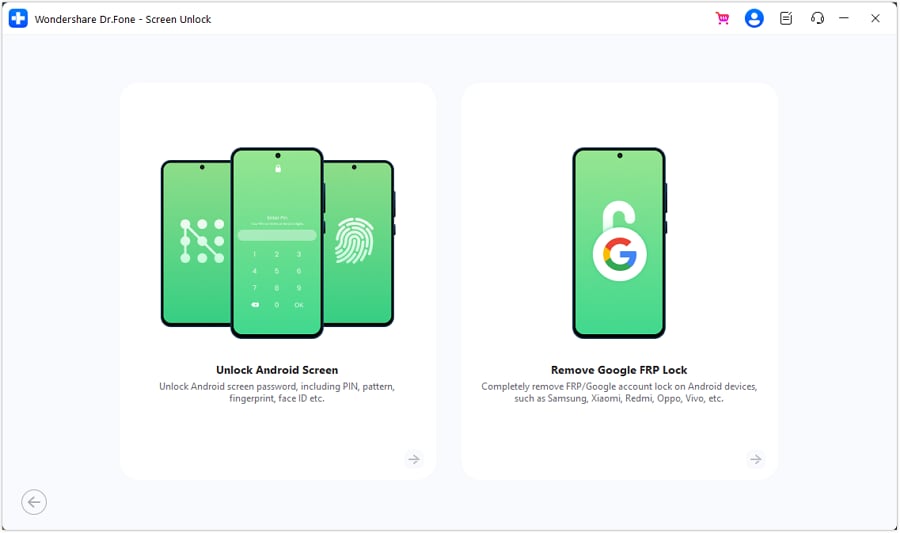
- Step 3: After that, you’ll be taken to a new screen where you can choose the brand of your mobile device.
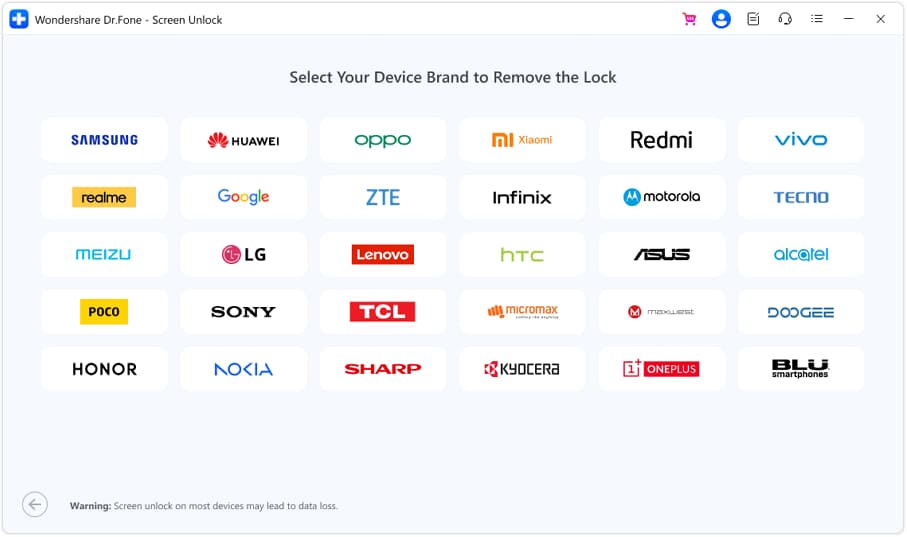
- Step 4: Once done, click the Remove without Data Loss button from the two options presented on the screen.
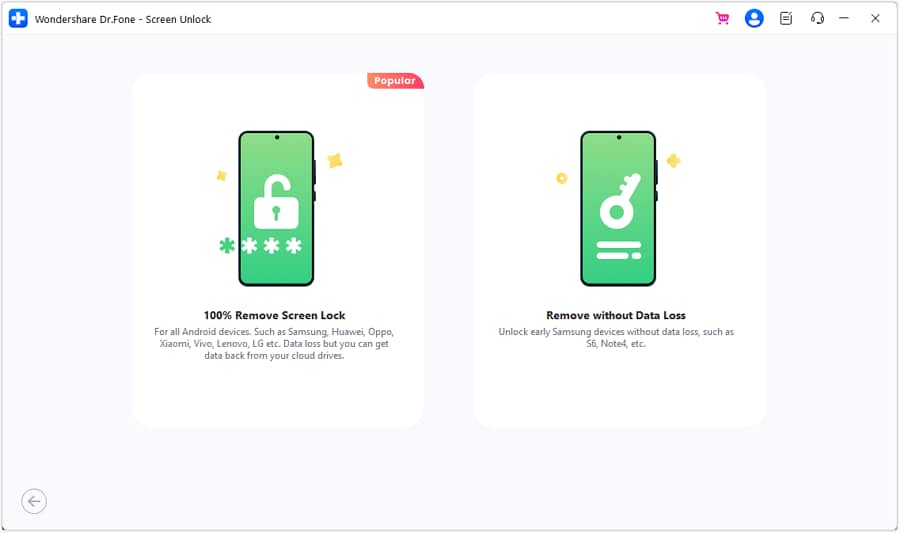
- Step 5: Unlocking the Android screen requires choosing the Brand, Device Name, and Device Model next. Enable the option that says I agree with the warning, and I am ready to proceed by clicking the corresponding checkbox. To proceed with unlocking the screen, click Next.
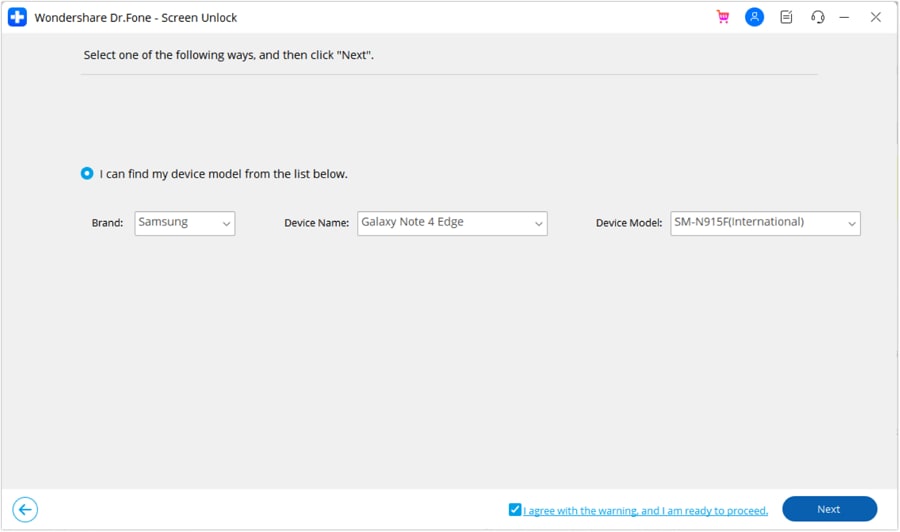
- Step 6: Type 000000 when asked to confirm the process. After entering the code, click Confirm to run the program.
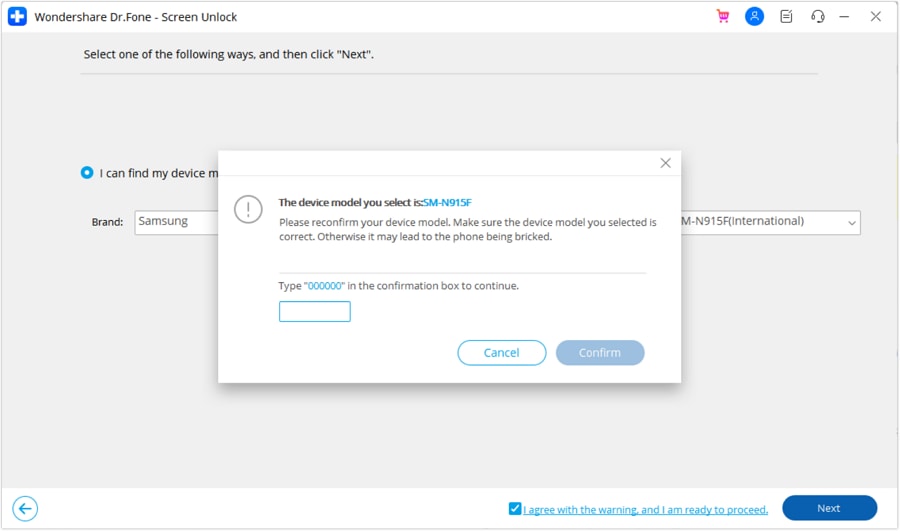
- Step 7: Once you’ve recognized your Android device’s model, Dr. Fone will walk you through entering Download Mode. Following the on-screen prompts will take you directly to the next screen. It then depicts the progress of the screen unlocking procedure, in which the platform’s required drivers and configuration files are downloaded.
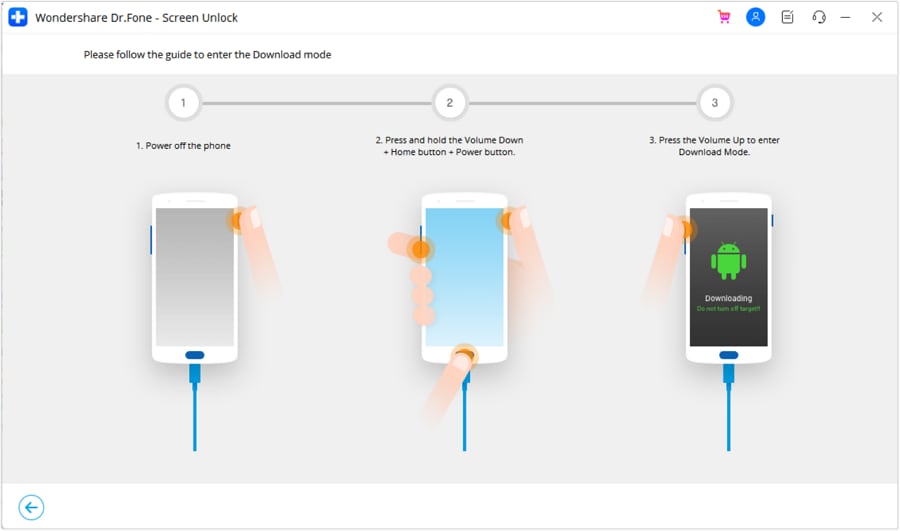
- Step 8: A new screen will appear, indicating the process has been completed. Click Done if your device’s screen unlock issue has been successfully fixed. If not, click the Try Again button.
Dr.Fone – Screen Unlock (Android) acts as your trusty guide, leading you through the maze of locked screens and inaccessible settings. It unlocks your phone first and enables USB debugging without the frustrating barriers.
Learn More About Android Unlock:
Samsung Unlock Codes to Unlock Samsung Phones [2024 Updated]
Unlocking Your Realme Phone Made Easy: No Data Loss!
The Best Android Unlock Software of 2024
Conclusion
In face of locked screens, USB debugging is a beacon of access and troubleshooting for your Android device. Remember, enabling USB debugging on a locked phone is crucial, opening doors to unforeseen solutions. However, what if you want to enable USB debugging on locked phones, but the process gets messy?
Then, it’s time to consider Dr.Fone - Screen Unlock (Android). It effortlessly paves the way to enable USB debugging on locked phones. By ensuring your device’s security and accessibility, even in locked states, Dr.Fone empowers you to navigate through obstacles, safeguarding your data while unlocking endless possibilities.
How to Change Lock Screen Wallpaper on Vivo S18e
Every smartphone user wants their lock screen wallpapers to be the finest quality. Since the Vivo S18e device comes with a generic lock screen wallpaper on itself, changing it is necessary. Regardless of your Android device, the need to change the lock screen wallpaper on Android is significant. If so, the article will provide two diverse techniques familiar to any Android device.
Along with the basic methods, the article will redirect its discussion to changing the lock screen wallpaper for different brands. Find more about how to change the lock screen wallpaper on Android with the available methods and techniques to bring aesthetics to your device.
Part 1: How To Change Lock Screen Picture on Android Phone With 2 Common Methods
Every Android smartphone has its interface to follow while changing the lock screen wallpaper or screen saver of the Vivo S18e device. However, before we dive into the Vivo S18e device-specific details, let’s dissect the two common methods to change the lock screen wallpaper on Android:
Method 1: Pressing Home Screen Method
The first thing to try for changing the lock screen wallpaper includes the long press technique. This technique is available for almost all Android devices, a basic approach to changing lock screen wallpapers. To know how it is done, follow the steps provided below:
Step 1: As you unlock your Android smartphone, press the clear region until the home-screen options appear on the front.
Step 2: Select the “Wallpaper” option in the available buttons to lead to another window showing different wallpapers.

Step 3: Out of all the wallpapers, select any of them and tap on the “Apply” button to set it as your lock screen wallpaper.
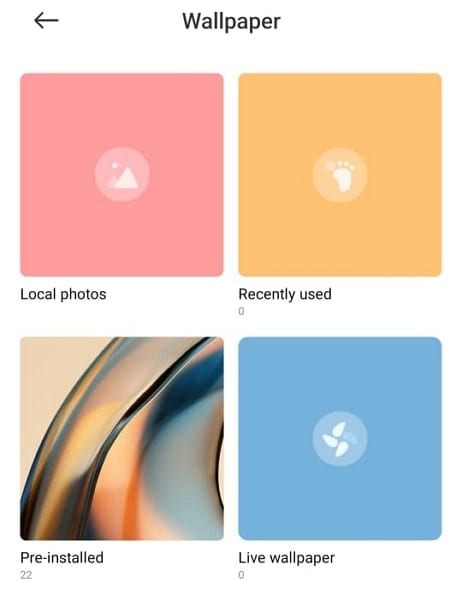
Method 2: Using Your Gallery
You can also set your favorite picture as the Android lock screen wallpaper from the settings provided in your gallery. To know how you can utilize your device’s Gallery, look into the steps provided next:
Step 1: Access the menu of your Android device and locate the “Gallery” app in the available options. Continue to locate your respective photo in the “Albums.”
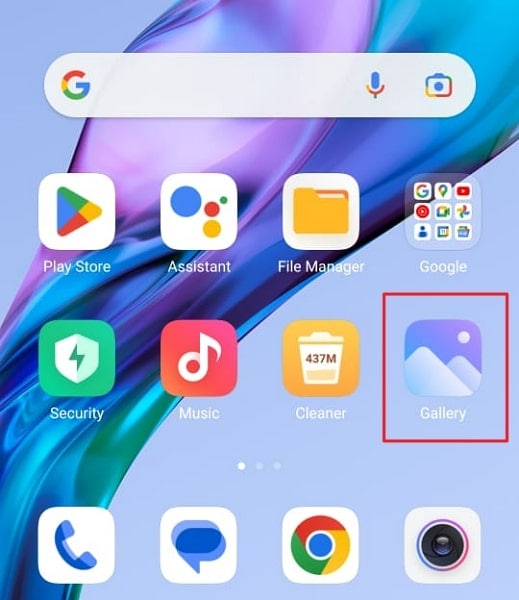
Image name: lock-screen-wallpaper-on-android-3.jpg
Image alt: access the gallery
Step 2: Choose and open the image on the screen, and continue to select the “Three-Dotted” icon on the bottom-right of the screen.

Step 3: On selecting the option of “Set as wallpaper,” you will apply the particular image from the Gallery as your lock screen wallpaper.
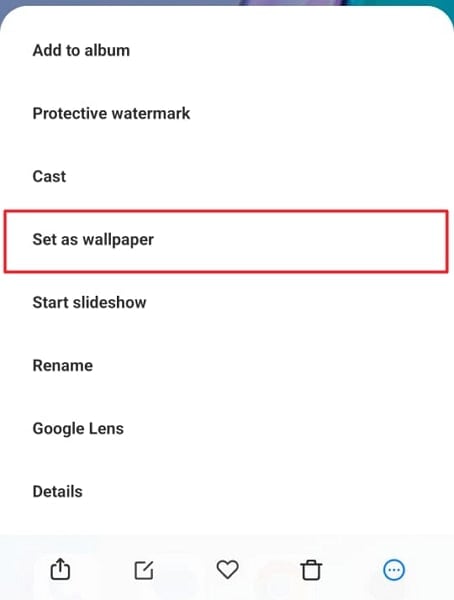
Part 2: How to Change Lock Screen Wallpaper on Different Brands of Android Phones
The provided methods in the above part are comprehensive in changing the lock screen wallpaper of any Android smartphone. This, however, is not the same and is true for every Android device in the market. Since the difference in operation brings a clash for many users, the need for an idea for different smartphone brands is essential.
For this part, we will bring a guide explaining how to change the lock screen wallpaper on Android of different brands:
For Samsung Users
Step 1: On unlocking your Samsung, hold the empty space on your home screen to open a set of options. Select “Wallpapers” from the available list and continue to the next screen.
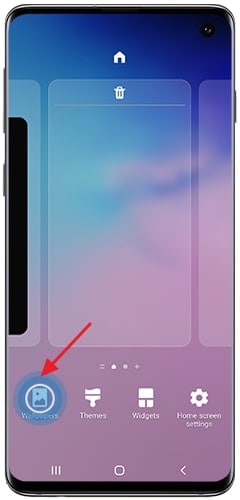
Step 2: Choose the option of “My wallpapers” or “Gallery” from the available list and select the wallpaper of your choice. As you select one, you will have to set it as your “Home screen,” “Lock screen,” or wallpaper for both screens.
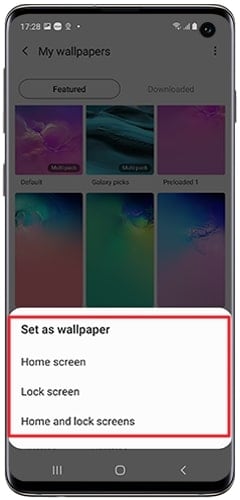
Step 3: Once you observe the image on the preview window, tap on the button on the bottom to set it as your lock screen wallpaper.

Step 1: As you access the home screen of your Google Pixel, continue to hold the space. This will open a list of options where you must tap on “Wallpaper & style.” Continue to select the “Change wallpaper” option to bring new colors to your Google Pixel.
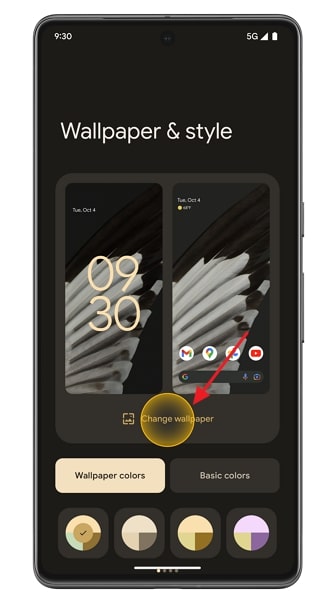
Step 2: On the next screen, select any particular category you want to set the lock screen wallpaper. For instance, if you selected “My photos,” choose your image and preview it on the following screen.
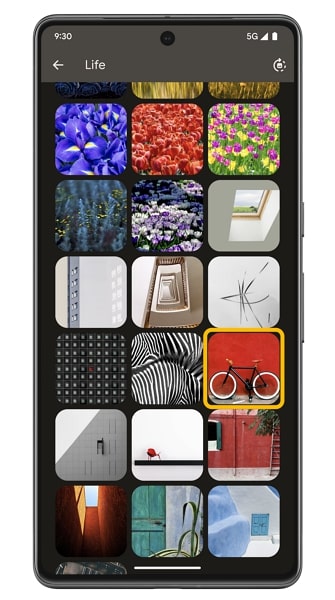
Step 3: To proceed, specify where you wish to set it as your wallpaper. As the options appear on the front, select the “Lock screen” option and continue to set your wallpaper.
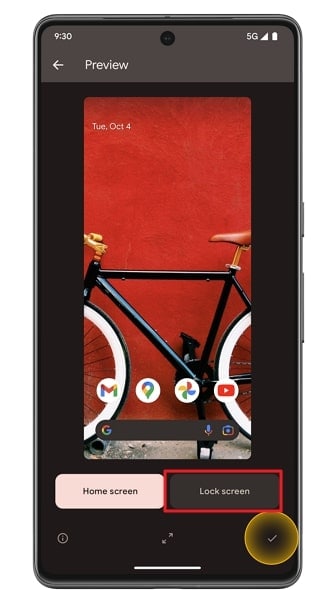
For Motorola Users
Step 1: Lead into the “Settings” of your Motorola device and look for the “Wallpaper & style” option in the list.
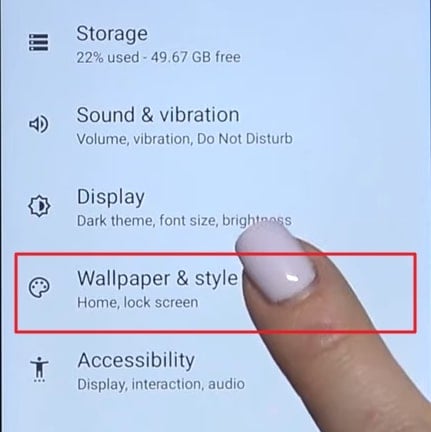
Step 2: Select any options appearing on the next screen that defines the location from where you will add the new wallpaper. Selecting a particular wallpaper from the available options leads to the “Preview” screen.
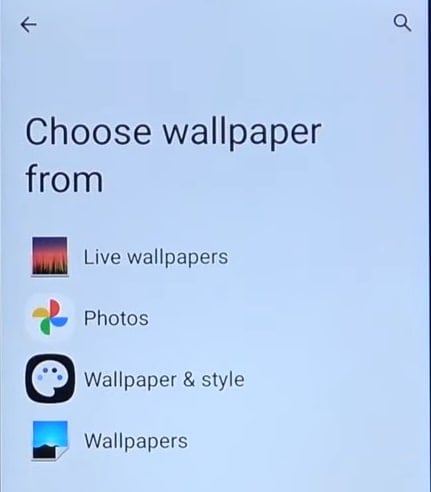
Step 3: Continue to select the “Lock Screen” option on the preview screen and tap on the “Tick” icon at the bottom. To confirm, tap “Lock screen” to change the wallpaper on the lock screen of your Motorola.

Step 1: Launch the “Settings” application on your OnePlus smartphone and continue to the “Personalizations” option.

Step 2: On the next screen, continue to the “Wallpapers” section and go through the available media to select a new wallpaper.

Step 3: As you select a particular wallpaper and continue to the preview screen, select the “Apply” button and proceed to choose “Lock Screen” from the pop-up menu.
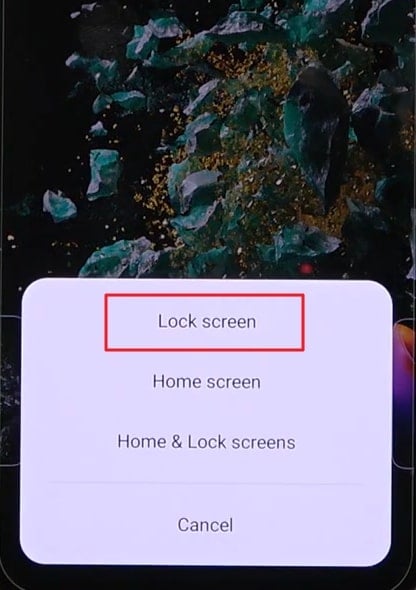
Part 3: Top 10 Download Sites About Cool Screen Wallpaper on Android
What if you feel that you do not have the coolest screen wallpaper that you can change on your Android device? Before changing your Android lock screen wallpaper on your device, find a unique option that can be easily replaced. Instead of limiting yourselves to the options available on the Vivo S18e device, you can consider moving to different download sites for downloading the coolest lock screen wallpaper:
1. Zedge
Zedge is one of the most premium websites for accessing wallpapers for Android devices. With accessibility to content from exclusive artists, Zedge presents the best personalization options to its users. For effective wallpaper creation, you can add your creativity to bring in the best results for your device.
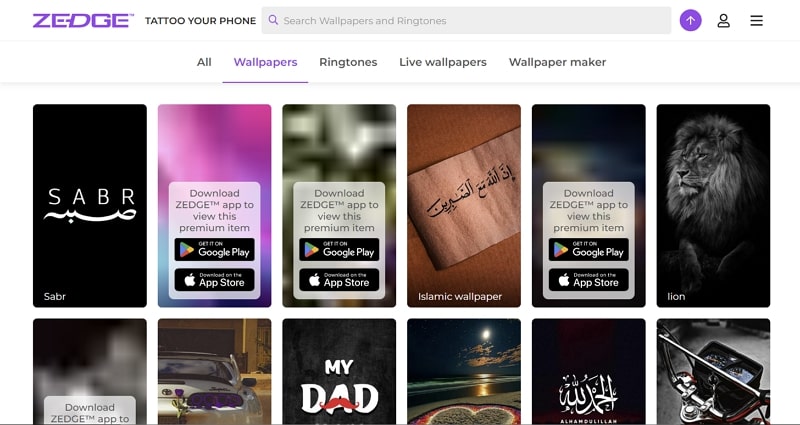
2. Interfacelift
For exclusive access to free wallpapers of multiple categories, Interfacelift provides some impressive and high-quality results. This intuitive wallpaper site provides some captivating options. Along with that, it asserts a special force on photographs of landscapes, which makes it a great site.

3. Unsplash
Known for keeping royalty-free, high-quality content, Unsplash can be a great Android wallpaper site. Download your favorite wallpapers that will perfectly suit your Android device. Along with its smooth interface, Unsplash offers diversity with its dedicated Unsplash+ plan.
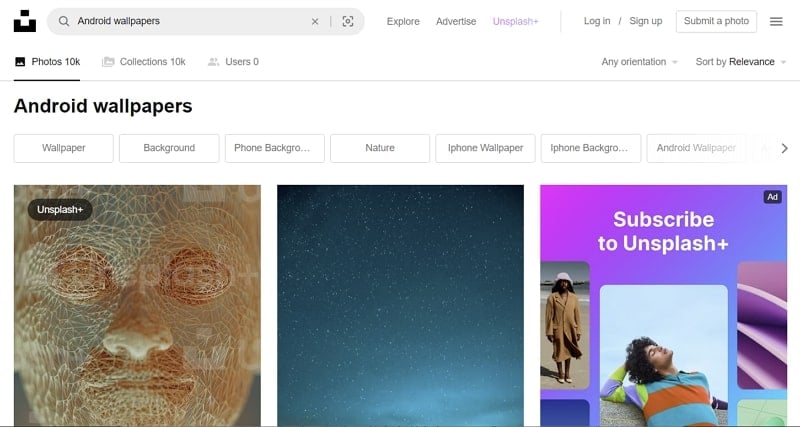
4. Mobile9
For variety, you can always go for Mobile9. This unique, expressive, and productive wallpaper site provides the best Android wallpapers. Following this, it offers multiple diversity of content, including ringtones and books. However, to get your hands on the finest quality wallpaper, do consider trying the site.
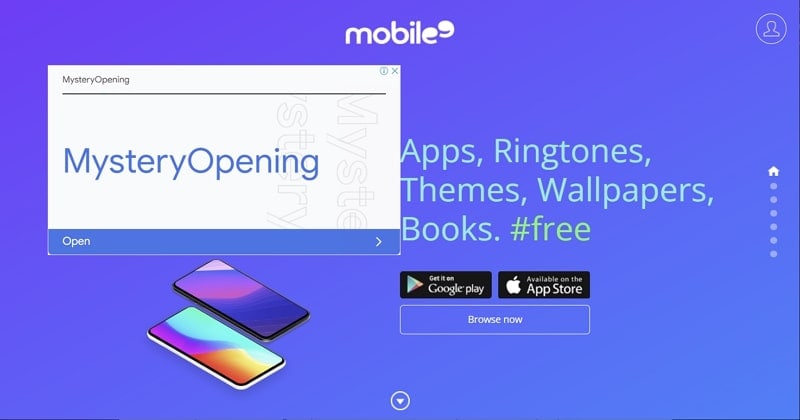
5. Dribbble
If you seek the best design for your Android lock screen, Dribbble provides the finest quality. Out of the 10,000+ designs, you can find your choice. Along with that, the site service also presents the wallpapers in dedicated categories. Searching for the right Android lock screen wallpaper gets easy in such an environment.

6. Wallpapers.com
For a service that provides dedicated Android lock screen wallpapers, Wallpapers.com holds a good position. With the finest wallpapers to use on the Android device, you can also customize the available wallpapers. Dedicated categories make it easy for users to select their favorite wallpaper from the 1000+ options.
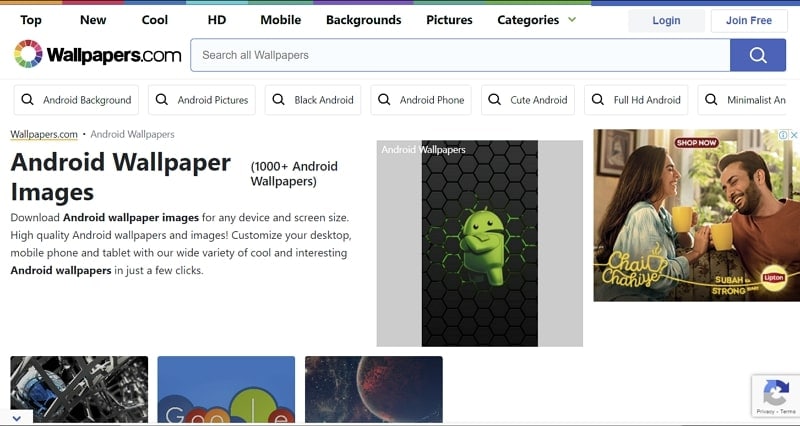
7. Pexels
There are very few websites that offer the finest quality wallpapers for free. Pexels, being one of them, displays a great interface for users with sub-categorization. With descriptions for every wallpaper, you can select the best one for your device. Find a categorized section of more than 70,000 wallpapers on this platform.

8. Pixabay
Who won’t have heard of Pixabay as a haven for lock screen wallpapers? This platform provides a different perspective on wallpaper search. To find the best option, you can diversify your search according to orientation, size, and color. This makes your search much easier and swift for changing the Android lock screen.
9. 500px
To access the best wallpapers in the world, 500px is a good platform to keep in mind. While it helps a wide community fulfill their tasks, it can be a purposeful option. For diverse operability in the site, users can also sell their work into a global marketplace.

10. Wallpaperswide
From desktop to Android wallpapers, Wallpaperswide holds a diverse set of options. This platform is designed to provide a diversity of categories to its users. With a simple interface, it is a great option for gathering content.

Bonus Part: How To Unlock Android Screen if Forgotten the Password
Although you have learned how to change the lock screen wallpaper on Android, multiple complications can arise. One such problem that can occur on your device involves it getting locked. If the Vivo S18e device gets locked, you cannot use it. For an Android whose password is locked, you will require a platform to amend the problem.
Dr.Fone – Screen Unlock (Android) provides a complete platform to unlock the Android device. This is the right place to go if you seek to remove such locks from your device within minutes. With the option of bypassing any screen lock, it can protect your device’s data.
Such options make it the finest platform to resolve issues with the Android device. To know how one can unlock their Android device with Dr.Fone, look through the provided steps:
Step 1: Open Screen Unlock Tool
You need to download and launch Dr.Fone on your computer and continue to the “Screen Unlock” tool. On accessing the tool, connect your Android device with a cable.

Step 2: Start Unlocking the Android
Proceed to select the “Unlock Android Screen/FRP” option and continue into the “Unlock Android Screen” option.

Step 3: Select Mode and Device Details
If you intend not to lose data, continue to the “Remove without data loss” option. You will have to select the details of the connected Android device.
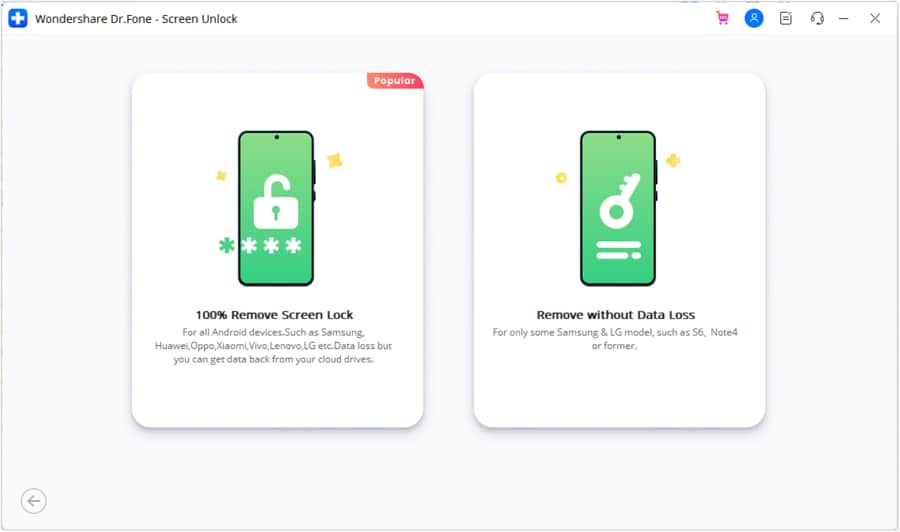
Step 4: Access Download Mode
Put your Android device in Download Mode by powering it off. Continue to press the “Volume Down,” “Home,” and “Power” buttons simultaneously. After a few seconds, press the “Volume Up” button to enter the Download Mode.

Step 5: Unlock Android Successfully
The package starts downloading as the Vivo S18e device gets into Download Mode. It will take a while until it completes. Once the download process gets completed, press the “Remove Now” button to remove the Android screen lock.
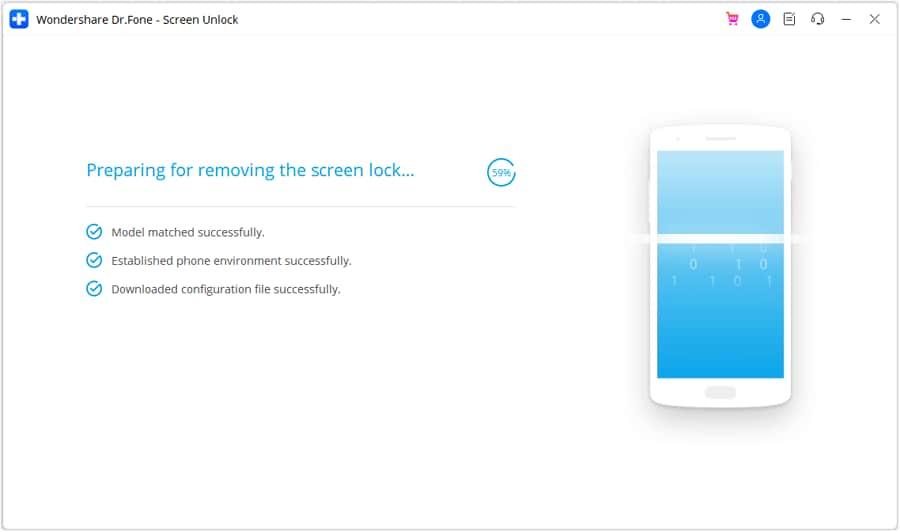
Image name: lock-screen-wallpaper-on-android-32.jpg
Image link: https://images.wondershare.com/drfone/guide/android-unlock-07.png
Image alt: start removing screen lock
Conclusion
The details provided are comprehensive in helping you change the lockscreen wallpaper on Android. While learning unique ways, along with dedicated techniques for smartphones, we are sure that you are clear about how to change lock screen picture on Android phone.Why not take a try now? This article has also introduced some of the best sites to download Android wallpapers. For effective results and to save your locked device from getting useless, use Dr.Fone – Screen Unlock.
How to Show Wi-Fi Password on Vivo S18e
Since the invention of Android OS in 2008 by Andy Rubin, our world has faced a dramatic change. Android seems to be controlling a considerably high portion of our life. We have bought many gadgets that use this amazing OS and most of which are phones. But how much can you do with your Android phone? Developers are always making it more interesting to use this interface.
Most of the time, we use Android phones, we get faced with the need to access the internet. The Wi-Fi capability of these Android gadgets makes it super easy for us to surf the web. Throughout using Wi-Fi, we connect to a number of them. This could be at school, a sub-way café, the gym, buses, hospitals, hotels, towns, and the list is endless. A password secures most of this. Needless to say, our brain is weak to store all these passwords for future use, especially if you would want to connect with a different gadget you have recently bought or even your laptop. In this article, we will introduce you to how to find wifi password on rooted and also unrooted Android devices.
Part 1: Show Wifi Password on Rooted Android Device
What is Rooting?
First of all, what does rooting mean? You have probably used a Windows computer or even Linux. For the case of Windows, when installing a new program or software, it always prompts a dialog box saying, “Administrator permission required to run this program.” If you don’t have the administrator permission, you won’t install the program. In Android, this is called rooting. In simple terms, it means having the root permission to your phone. Some Android apps will require you the root permission, e.g., flashing your ROM. In this part, we will explain how you can show the Wi-Fi password on your Android with root.
To find the Wi-Fi passwords on your Android phone, you need to have an app to explore files which also supports a root user. In this case, ES FileExplorer or Root Explorer will come in handy. However, it turns out that the latter is offered at $3. Let’s use the free ES File Explorer.
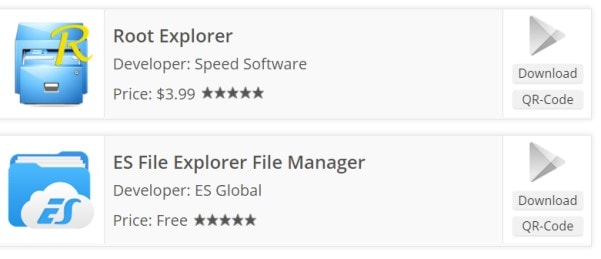
Steps of getting Wi-Fi password on Android with root
In only four steps, we, at this moment, learn how we can find the password of a Wi-Fi on an Android phone.
Step 1: Install the ES File Explorer
Download the ES File Explorer from your play store, install it, and open it.

Step 2: Enable Root Explorer
The root explorer needs to be enabled so that you can reach the root folders of the Wi-Fi passwords you need. By default, the root feature in this ES explorer is not enabled. To enable it, just tap on the list menu on the top left corner.:
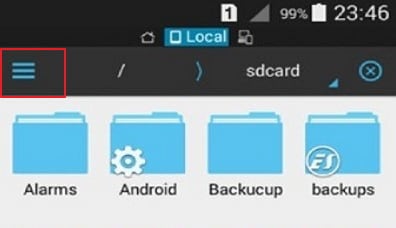
This will drop down a list of controls. Scroll down and find the Root Explorer option and enable it.
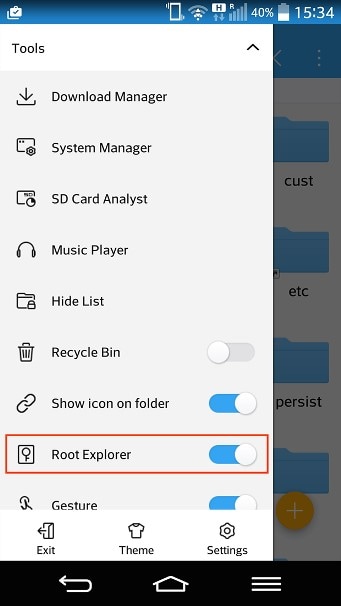
Step 3: Get the passwords’ file.
Go back to ES file explorer, and this time, find the folder named data.
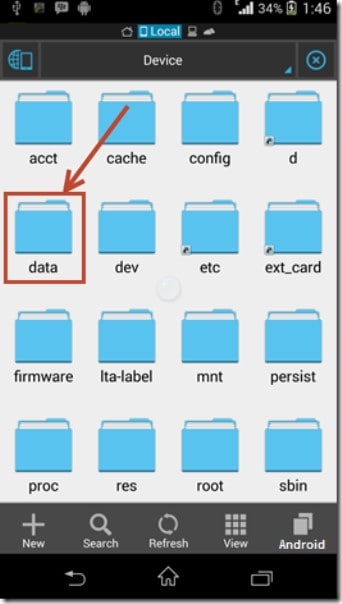
When this folder opens, find another one named misc. Open it and find another one named wifi. Here, find a file named wpa_supplicant.conf.

Step 4: Retrieve the wifi password on Android
Make sure that you don’t edit anything in the file. You might mess up with important data and fail to access the Wi-Fi(s) in the future.
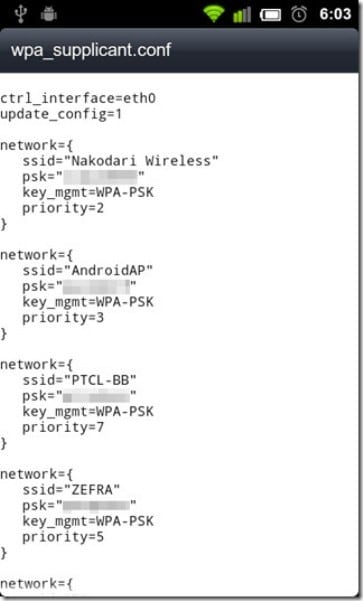
As you can see above, we have found the Wi-Fi passwords on the android device. On each network profile, we have the name of the network represented by name (ssid=”{the name}”), the network’s password represented by psk, the network’s access point represented by key_mgmt=WPA-PSK and its priority represented by priority.
Part 2: Show Wifi Password on Android without Root
What if I don’t have root access to my Android, can I still see Android Wi-Fi password? The short answer is yes. However, this is a bit involving but simple. You don’t need to be a computer guru to do it, but you need to have a computer and some internet access of course. The key thing is to find a way through which we can fetch the password file from the phone without using a root access protocol in the Android. This is made possible by some little programming insight using the Windows Command prompt.
Steps to show Wi-Fi password on Android without root
Step 1: Access the Developer authority
To access the files that Android uses to run passwords, you must first become a developer. This is very simple.
Get your Android phone and go to settings. Scroll down and find “About phone.” Tap on it and scroll down again to find Build number.

Tap on this “build number” 5 to 6 times until a message pops up, saying, “You are now a developer”.
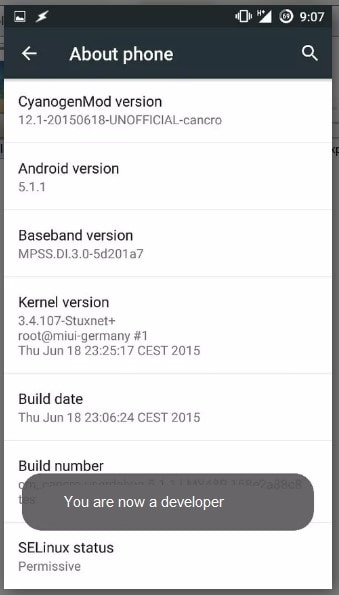
Step 2: Enable the debugging.
Go back to Settings. Scroll down for developer options. Turn on the button for “Android/USB debugging”.
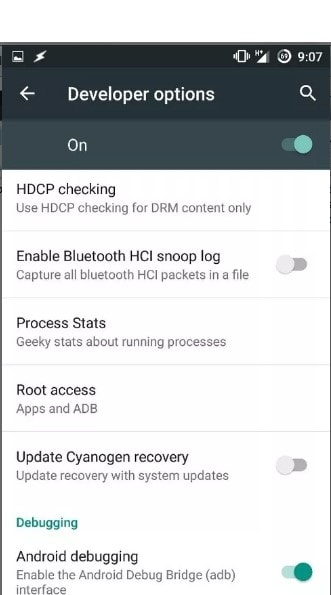
Step 3: Install ADB drivers.
Now, open your Windows desktop. Download and install ADB drivers. (Use this download link adbdriver.com ). You need to download and install platform tools (minimal ADB and fastboot) from http://forum.xda-developers.com/... Now open the folder where you’ve installed the above tools. By default, it is in the Local disc C\windows\system32\platform_tools location. However, you might want to locate them by searching on the windows search engine. You have to hold the Shift key and right-click inside the folder to click on”Open Command Window Here.”
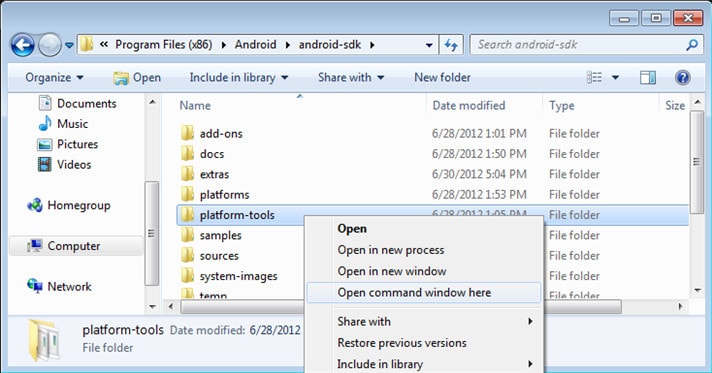
Step 4: Test the ADB
Here, we would like to test whether the ABD is working properly. To do this, connect your phone to the PC using a USB. In the command prompt, type adb services and then press enter. If it’s working properly, you should see a device on this list.

Step 5: Find the Android wifi password.
Now, it is time to type the given command in the command prompt and type: adb pull /data/misc/wifi/wpa_supplicant.conf c:/wpa_supplicant.conf. This will fetch the file from your phone to the local disc C drive of the PC.
Step 6: Get the wifi passwords.
Lastly, open the file with a notepad, and there you go.
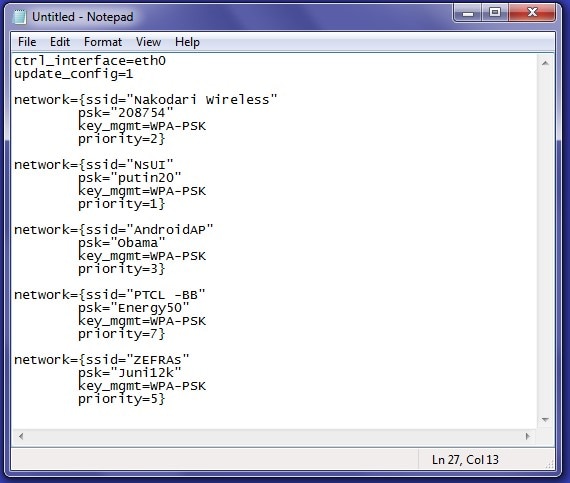
Now you learned how to show the wifi password on your Android device.
- Title: How To Enable USB Debugging on a Locked Vivo Phone
- Author: Peter
- Created at : 2024-07-16 10:47:09
- Updated at : 2024-07-17 10:47:09
- Link: https://android-unlock.techidaily.com/how-to-enable-usb-debugging-on-a-locked-vivo-phone-by-drfone-android/
- License: This work is licensed under CC BY-NC-SA 4.0.









